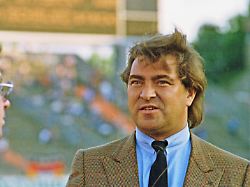Exactly thirty years ago, the Bundesliga celebrated its 1000th matchday. A special anniversary especially for the great idols and unsung heroes of this unique success story. But a dark veil settled around the celebrations.
Uwe Seeler loved the Bundesliga – but thirty years ago he made a serious “appeal to those responsible”: Everyone “must work more carefully and seriously, only spend the money that you earn.” Seeler’s words, no matter how well they may have been meant for the 1000th match day of the Bundesliga, did not fall on fertile ground – because at that very moment, in the spring of 1993, football began to experience an upswing in Germany as well, which was the case at the time no one could have foreseen. But Seeler’s concerns had a good reason. On the eve of the big anniversary, the two traditional clubs FC Schalke 04 and 1. FC Nürnberg suffered from two serious financial scandals – which brought the royal blue and the club to the brink of existence.
The “black coffers” of 1. FC Nürnberg have been making the headlines these days. The club’s former treasurer, Prof. Dr. dr Böbel had entrusted his knowledge of the “new Bundesliga scandal” to a major sports magazine. And as the “Sport Bild” wrote at the time, it was about “referee bribery, expense riding and nepotism”. In Nuremberg, the former record champions of the Bundesliga, there was panic. In addition to the outrageous allegations, the club was burdened with debts of almost 20 million marks. The public prosecutor’s office went in and out of the club at the time. But the people of Nuremberg were not alone in their distress. Hundreds of kilometers further north, FC Schalke 04 once again fought for survival shortly before the Bundesliga anniversary.
Günter Netzer sends the bailiff
The former savior of the club, the “Sun King” Günter Eichberg, had fallen into disrepute – and his former “breakfast manager” Günter Netzer had meanwhile sent the bailiff to the Ruhr area club. An almost unbelievable mountain of debt had accumulated in recent years – only veiled by a few supposedly clever financial maneuvers that were now slowly coming to light. Just like the club, the Royal Blues had lived far beyond their actual financial means and were now being presented with the bill for all to see through the media. Uwe Seeler’s appeal (“only spend the money you earn”) came too late for both clubs. It took a long time before the shards of this financial imbalance resurfaced at Schalke and in Nuremberg.
- Ben Redelings is a best-selling author and comedian from the Ruhr area.
His current book “60 Years Bundesliga. The Anniversary Album” is a modern classic from the publishing house “The workshop”
He travels throughout Germany with his football programs. Info & dates www.scudetto.de.
But despite all the dark clouds that hung over the Bundesliga thirty years ago in the spring, football Germany was happy about this special anniversary. The 1000th game day was on the program and the Schalke team, of all people, were to open it on Friday evening against SG Wattenscheid 09 (!) in the alternative venue of the Bochum Ruhr Stadium. The Royal Blues played under their new coach Helmut Schulte for the first time after the sacking of coach Udo Lattek. Schalke lost the first leg 3-4 at home despite three goals from Ingo Anderbrügge. The game in Bochum ended 0:0. Curious about it: The ex-coach of the Royal Blues, Udo Lattek, who was fired, still received 8,000 marks. His lavishly endowed contract continued, even though it wasn’t entirely clear at the time where the money for these payments was to come from.
“People even sat in trees back then”
But in addition to all the topicality, the anniversary was of course also an occasion for memories of the old days. Uwe Seeler’s eyes twinkled happily when he was asked about the first day of the game on August 24, 1963: “I will never forget it because it was new territory for all of us and made it so special. People even sat in trees back then. Everyone wanted to be there at the start of a new football dimension.”
And the Bundesliga had a lot to offer. In Münster, the so-called 100,000-mark storm around Fiffi Gerritzen, Jupp Lammers, Adi Preißler, Siegfried Rachuba and Rudi Schulz ran up and in Kaiserslautern they celebrated their Dutchman “Co” Prins, who had come from Ajax Amsterdam. On the occasion of the anniversary, his trainer Günter Brocker said of his “bastard” and star from Holland that he enjoyed “mixing flower petals with his fellow players while they were eating”.
“Money hasn’t played that dominant role yet”
In Frankfurt, one of the unsung heroes behind the scenes, the “jack of all trades” Anton Hübler, who had worked at Eintracht in various roles as a gardener, chauffeur for the President and kit manager, reported on the day when, with trembling hands, he received 110,000 marks from the Ticket offices across the city to the Riederwald – and had the worst thoughts about what could happen to him.
Looking back in 1993, Uwe Seeler recalled the first hours of the Bundesliga: “Money didn’t play that dominant role in the beginning.” That was different 999 match days later. Even the great German football idol Seeler could hardly believe what the world looked like in August thirty years ago, when the league started: “Honourable people set the tone: A Günter Mahlmann at HSV, who ran the shop. On a voluntary basis, understands itself.” As we know today: Even after the 1,000th match day, the wheel kept turning faster and faster. And there is still no end in sight for this unique Bundesliga success story!
